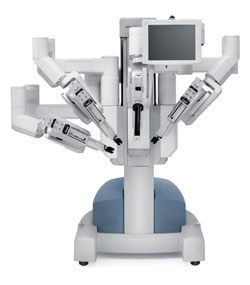 As everyone who reads this blog knows, I worry a lot about whether innovation is proceeding as fast as people think it is. That’s especially true in healthcare, where years of apparent advances have not cut death rates for middle-aged Americans.
As everyone who reads this blog knows, I worry a lot about whether innovation is proceeding as fast as people think it is. That’s especially true in healthcare, where years of apparent advances have not cut death rates for middle-aged Americans.
But some innovations are just tough to assess. Back in the late 1990s, a new medical technology was introduced with enormous fanfare: Robot-assisted surgery. The idea was that it was possible to partially automate surgery and drive down healthcare costs, just like manufacturing automation had driven down the cost of producing goods. In addition, robot-assisted surgery promised to have better outcomes.
The technology took some time to get traction, and then gained ground quickly. The best way is to track the stock price of the market leader, Intuitive Surgical (ISRG). The company went public in June 2000. At the end of 2000, the share price was $17. At the end of 2003, the share price was $16.97. Then it went shooting up (see stock chart here). Now the latest quote is an astounding $332.
But just this weekend a story appeared in the NYT about robot-assisted surgery. The story, entitled “Results Unproven, Robotic Surgery Wins Converts“, points out that the technology has been very successful commercially.
Last year, 73,000 American men — 86 percent of the 85,000 who had prostate cancer surgery — had robot-assisted operations, according to the robot’s maker, Intuitive Surgical, the only official source of such data. Eight years ago there were fewer than 5,000, Intuitive says.
Here’s the key sentence:
But robot-assisted prostate surgery costs more — about $1,500 to $2,000 more per patient. And it is not clear whether its outcomes are better, worse or the same.
The article then goes on to say that:
Medical researchers say the robot situation is emblematic of a more general issue. New technology has sometimes led to big advances, which can justify extra costs. But often, technology spreads long before investigators know whether it is worthwhile.
As a ’skeptical technological optimist’, the case of robot-assisted surgery is utterly perplexing for me. It’s exactly the sort of technology that should pay off big, either in cost or in health outcomes or both. But then I would expect the gains to be big enough to see. Or, is it just too soon?
I think I’ll give the folks at Intuitive a call.
Disclaimer: This page contains affiliate links. If you choose to make a purchase after clicking a link, we may receive a commission at no additional cost to you. Thank you for your support!


Leave a Reply